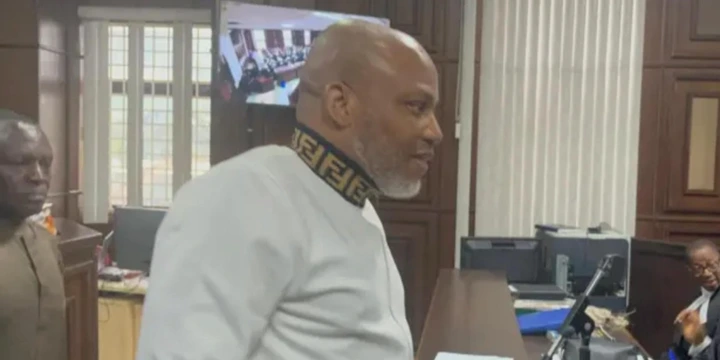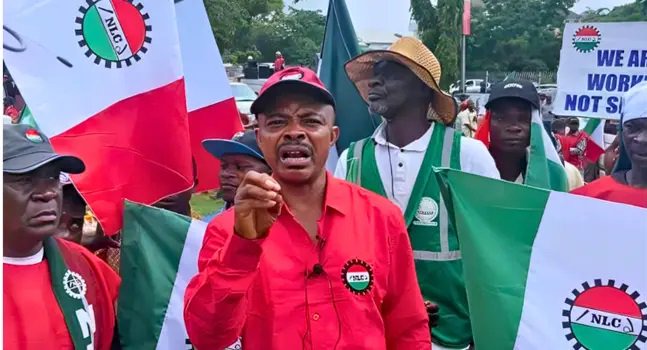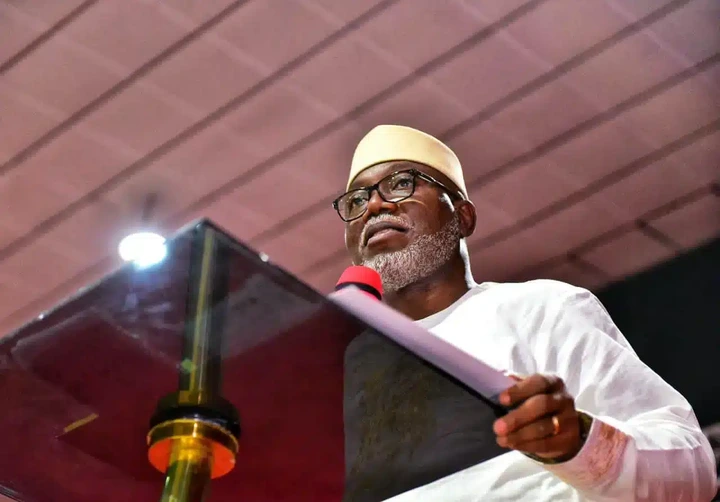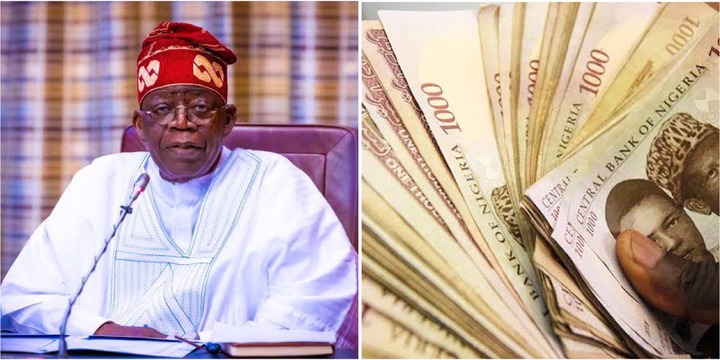Quickly! Watch The Video Before It’s Deleted! |Save Hot 3:00 Minutes $3x V!de0s To Ur Phone Directly | Watch 2:00 H0t $3x V!d0es Now!
Quickly! Watch Before It’s Deleted! Another Popular Nigeria Pastors Wife $leeps With Male Church Member, Husband Engaged In Physical Compact Him. Watch The Full Video Here Now.
The lawyer pointed out that Section 36(9) of the Constitution clearly prohibits a person who has been acquitted from being tried again “save upon the order of a superior court.”
Barrister Njoku Jude Njoku, one of the lawyers representing the detained leader of the Indigenous People of Biafra (IPOB), Nnamdi Kanu, has accused the Supreme Court of Nigeria of “false interpretation” in the IPOB leader’s case.
Njoku strongly criticised the apex court’s handling of Kanu’s case, describing the Supreme Court’s position on Kanu’s retrial as a “false interpretation” of the principle of double jeopardy and the meaning of “superior court” under Nigeria’s Constitution.
In a statement issued on Monday, Njoku said that Nigerian courts have long relied on outdated authorities to hold that if a trial is declared a nullity, it is as though no trial ever occurred.
This, he explained, has been used to justify retrials despite the constitutional bar against double jeopardy in Section 36(9) of the 1999 Constitution.
“Judges wrongly equate “superior court” with a higher court in hierarchy. This position is rooted in older authorities such as Orakunnure v. State (1969) and Erekannure v. State (1973),” Njoku said.
The lawyer pointed out that Section 36(9) of the Constitution clearly prohibits a person who has been acquitted from being tried again “save upon the order of a superior court.”
He argued that “superior court” does not mean a higher court in hierarchy, but instead refers to the class of superior courts of record listed under Section 6(5), which include the Supreme Court, Court of Appeal, Federal High Court, and State High Courts.
“This is the same logic applied in Section 46(1) cases, where both Federal and State High Courts are recognised as equal superior courts of record. They are not hierarchically superior to one another,” he stated.
Quoting the case of Madukolu v. Nkemdilim (1962), Njoku noted that Nigerian judges often describe jurisdiction as the “lifeblood of adjudication.”
Yet, he argued, courts have contradicted themselves by nullifying trials for want of jurisdiction while still ordering retrials.
“This is the judicial equivalent of speaking from both sides of the mouth. If jurisdiction is truly lifeblood, then once absent, the body is dead, it cannot be revived by decree,” he said.
Njoku recalled that in Dikko v. The State (2016), the Supreme Court held that once a trial is declared a nullity, the accused stands discharged and acquitted, and the matter cannot be reopened to his detriment.
“This is decisive. A declaration of nullity ends the trial entirely. The accused is not merely discharged procedurally, he is acquitted as a matter of law,” he stressed.
He added that the option of filing fresh charges against Kanu was barred since the Terrorism Prevention (Amendment) Act 2013, under which he was charged, had been repealed by the 2022 Act.
Njoku insisted that the Court of Appeal’s October 2022 discharge of Kanu marked the end of his legal jeopardy.
“Any retrial after this point is unconstitutional and amounts to erasing Section 36(9),” he stated.
The lawyer warned that interpreting “superior court” to mean only a higher court in hierarchy would leave most Nigerians without the constitutional protection against double jeopardy unless their cases reached the Supreme Court.
“That cannot be the law. Section 36(9) guarantees equal protection for all Nigerians, not just those whose cases get to the apex court,” Njoku said.
Njoku described the apex court’s December 2023 ruling in FRN v. Kanu as “judicial self-contradiction.”
“The court declared jurisdiction lacking but still ordered a retrial, equated ‘superior court’ with ‘higher court,’ and ignored its own precedent in Dikko v. State. This is an attempt to square a circle, and it undermines the Constitution itself,” he argued.
Njoku urged a judicial rethink, calling for a “declaration that “superior court” in Section 36(9) refers to the class of superior courts of record in Section 6(5), not hierarchical superiority.
“A declaration that once a superior court of record has discharged an accused, jeopardy ends and retrial is unconstitutional.
“A recognition that under Dikko v. State (2016), once a trial is declared a nullity the accused is discharged and acquitted, and the case cannot be reopened.
“A finding that the Supreme Court’s ruling of December 2023 in FRN v. Kanu was per incuriam, unconstitutional, and void ab initio.”
Njoku argued that Nigerian courts cannot say in Section 46 that the High Court includes both Federal and State High Courts, and turn around to say that Section 36(9) means a higher court in the hierarchy.
“They cannot say jurisdiction is lifeblood, and then conjure it from thin air. They cannot ignore their own authority in Dikko v. State (2016),” he said.
Njoku stressed, “The Constitution guarantees double jeopardy protection to all Nigerians. Once the Court of Appeal discharged Kanu, jeopardy ended. Any retrial is unconstitutional.”
He warned that unless corrected, the judiciary’s contradictory stance would further erode public confidence in Nigerian courts.
Quickly! Watch The Video Before It’s Deleted! |Save Hot 3:00 Minutes $3x V!de0s To Ur Phone Directly | Watch 2:00 H0t $3x V!d0es Now!
Quickly! Watch Before It’s Deleted! Another Popular Nigeria Pastors Wife $leeps With Male Church Member, Husband Engaged In Physical Compact Him. Watch The Full Video Here Now.


 Entertainment4 months ago
Entertainment4 months ago
 Politics4 months ago
Politics4 months ago
 Breaking News6 months ago
Breaking News6 months ago
 Breaking News5 months ago
Breaking News5 months ago
 Breaking News5 months ago
Breaking News5 months ago
 Breaking News5 months ago
Breaking News5 months ago
 Breaking News6 months ago
Breaking News6 months ago
 Breaking News6 months ago
Breaking News6 months ago

